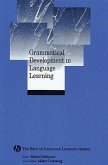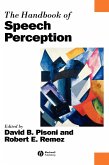Handbook Child Language
Herausgeber: Fletcher, Paul; Macwhinney, Brian
Handbook Child Language
Herausgeber: Fletcher, Paul; Macwhinney, Brian
- Broschiertes Buch
- Merkliste
- Auf die Merkliste
- Bewerten Bewerten
- Teilen
- Produkt teilen
- Produkterinnerung
- Produkterinnerung
This volume, in its 25 definitive chapters on normal and nonnormal language development, represents the authoritative and up-to-date complete sourcebook on child language development. All aspects of child language development are addressed, including phonetics, phonology, grammar, and lexical development. Connectionism and government-binding theory, as applied to language development, are fully represented. The relevance of input, cognition, and social factors to language development is explored. Chapters on methodology, particularly using computer databases, are provided for both normal and nonnormal acquisition.…mehr
Andere Kunden interessierten sich auch für
![Research Methods in Child Language Research Methods in Child Language]() Research Methods in Child Language62,99 €
Research Methods in Child Language62,99 €![The Handbook of Applied Linguistics The Handbook of Applied Linguistics]() DAVIES A ALAN / ELDER C CATHERINEThe Handbook of Applied Linguistics79,99 €
DAVIES A ALAN / ELDER C CATHERINEThe Handbook of Applied Linguistics79,99 €![Grammatical Development in Language Learning Grammatical Development in Language Learning]() Robert DekeyserGrammatical Development in Language Learning57,99 €
Robert DekeyserGrammatical Development in Language Learning57,99 €![The Handbook of Plurilingual and Intercultural Language Learning The Handbook of Plurilingual and Intercultural Language Learning]() The Handbook of Plurilingual and Intercultural Language Learning183,99 €
The Handbook of Plurilingual and Intercultural Language Learning183,99 €![The Handbook of Speech Perception The Handbook of Speech Perception]() DAVID B. PISONI / ROBERT E. REMEZThe Handbook of Speech Perception274,99 €
DAVID B. PISONI / ROBERT E. REMEZThe Handbook of Speech Perception274,99 €![Handbook of Intercultural Disc Handbook of Intercultural Disc]() Handbook of Intercultural Disc51,99 €
Handbook of Intercultural Disc51,99 €![The Handbook of Discourse Analysis The Handbook of Discourse Analysis]() Deborah TannenThe Handbook of Discourse Analysis69,99 €
Deborah TannenThe Handbook of Discourse Analysis69,99 €-
-
-
This volume, in its 25 definitive chapters on normal and nonnormal language development, represents the authoritative and up-to-date complete sourcebook on child language development. All aspects of child language development are addressed, including phonetics, phonology, grammar, and lexical development. Connectionism and government-binding theory, as applied to language development, are fully represented. The relevance of input, cognition, and social factors to language development is explored. Chapters on methodology, particularly using computer databases, are provided for both normal and nonnormal acquisition.
Hinweis: Dieser Artikel kann nur an eine deutsche Lieferadresse ausgeliefert werden.
Hinweis: Dieser Artikel kann nur an eine deutsche Lieferadresse ausgeliefert werden.
Produktdetails
- Produktdetails
- Verlag: Wiley
- Revised edition
- Seitenzahl: 800
- Erscheinungstermin: 23. Dezember 1996
- Englisch
- Abmessung: 254mm x 178mm x 42mm
- Gewicht: 1475g
- ISBN-13: 9780631203124
- ISBN-10: 0631203125
- Artikelnr.: 23237851
- Herstellerkennzeichnung
- Libri GmbH
- Europaallee 1
- 36244 Bad Hersfeld
- gpsr@libri.de
- Verlag: Wiley
- Revised edition
- Seitenzahl: 800
- Erscheinungstermin: 23. Dezember 1996
- Englisch
- Abmessung: 254mm x 178mm x 42mm
- Gewicht: 1475g
- ISBN-13: 9780631203124
- ISBN-10: 0631203125
- Artikelnr.: 23237851
- Herstellerkennzeichnung
- Libri GmbH
- Europaallee 1
- 36244 Bad Hersfeld
- gpsr@libri.de
Paul Fletcher is Professor of Linguistics at the University of Reading. Brian MacWhinney is Professor of Psychology at Carnegie Mellon University.
List of Contributors.
Acknowledgments.
Part I: Theory, Method, and Context.
Introduction.
Theoretical Approaches.
1. Parameters in Acquisition: Jürgen M. Meisel (University of Hamburg).
2. Connectionist Approaches to Language Acquisition: Kim Plunkett (Oxford
University).
3. The Impact of Language Socialization on Grammatical Development: Elinor
Ochs (University of California at Los Angeles) and Bambi Schieffelin (New
York University).
Methods.
4. Individual Differences and their Implications for Theories of Language
Development: Elizabeth Bates (University of California at San Diego),
Philip S. Dale (University of Washington), and Donna Thal (San Diego State
University).
5. Computational Analysis of Interactions: Brian MacWhinney (Carnegie
Mellon University).
Social and Contextual Influences.
6. Issues in the Study of Input: Finetuning, Universality, Individual and
Developmental Differences, and Necessary Causes: Catherine E. Snow (Harvard
University Graduate School of Education).
7. Discourse Organization and the Development of Reference to Person,
Space, and Time: Maya Hickmann (Université René Descartes, Paris Centre
National de la Recherche Scientifique, EPHE).
8. Bilingual Language Acquisition: Annick de Houwer (Belgian National
Science Foundation and University of Antwerp).
9. Socialization across Contexts: Richard Ely (Boston University) and Jean
Berko Gleason (Boston University).
Part II: The Emergence and Consolidation of Linguistic Abilities:.
Introduction.
The Spoken Language: Early Speech Development.
10. Development of the Capacity for Spoken Language: John L. Locke
(Massachusetts General Hospital and Harvard Medical School).
11. Phonetic Abilities in the First Year of Life: Ray D. Kent (University
of Wisconsin-Madison) and Giuliana Miolo (University of Wisconsin-Madison).
12. Phonological Development: Lise Menn (University of Colorado) and Carol
Stoel-Gammon (University of Washington).
Learning Words.
13. Early Lexical Development: Martyn Barrett (University of Surrey).
14. Later Lexical Development and Word Formation: Eve V. Clark (Stanford
University).
15. The Role of Syntax in Verb Learning: Lila R. Gleitman (University of
Pennsylvania) and Jane Gillette (University of Pennsylvania).
Learning Grammar.
16. Reinterpreting Children's Sentence Comprehension: Toward a New
Framework: Roberta Michnick Golinkoff (University of Delaware) and Kathy
Hirsh-Pasek (Temple University).
17. Strategies in the Acquisition of Syntax: Ann M. Peters (University of
Hawai¿i).
18. Phrase Structure and Functional Categories: Andrew Radford (University
of Essex).
19. Empty Categories and Complex Sentences: The Case of wh-Questions: Jill
de Villiers (Smith College).
Part III: Nonnormal Language Development.
Introduction.
20. Computational Approaches to the Analysis of Language Impairment: Jon F.
Miller (University of Wisconsin-Madison) and Thomas Klee (University of
Newcastle upon Tyne).
21. Phonological Impairment: Laurence B. Leonard (Purdue University).
22. Grammatical Impairment: Paul Fletcher (Reading University) and Richard
Ingham (University of Reading).
23. Pragmatic Impairments: Holly K. Craig (University of Michigan).
24. Language Development in Children and Adolescents with Down Syndrome:
Robin S. Chapman (University of Wisconsin-Madison).
25. Lexical and Grammatical Development in Children with Early Hemisphere
Damage: A Cross-sectional View from Birth to Adolescence: Julie A. Eisele
(Skidmore College) and Dorothy M. Aram (Emerson College).
References.
Index.
Acknowledgments.
Part I: Theory, Method, and Context.
Introduction.
Theoretical Approaches.
1. Parameters in Acquisition: Jürgen M. Meisel (University of Hamburg).
2. Connectionist Approaches to Language Acquisition: Kim Plunkett (Oxford
University).
3. The Impact of Language Socialization on Grammatical Development: Elinor
Ochs (University of California at Los Angeles) and Bambi Schieffelin (New
York University).
Methods.
4. Individual Differences and their Implications for Theories of Language
Development: Elizabeth Bates (University of California at San Diego),
Philip S. Dale (University of Washington), and Donna Thal (San Diego State
University).
5. Computational Analysis of Interactions: Brian MacWhinney (Carnegie
Mellon University).
Social and Contextual Influences.
6. Issues in the Study of Input: Finetuning, Universality, Individual and
Developmental Differences, and Necessary Causes: Catherine E. Snow (Harvard
University Graduate School of Education).
7. Discourse Organization and the Development of Reference to Person,
Space, and Time: Maya Hickmann (Université René Descartes, Paris Centre
National de la Recherche Scientifique, EPHE).
8. Bilingual Language Acquisition: Annick de Houwer (Belgian National
Science Foundation and University of Antwerp).
9. Socialization across Contexts: Richard Ely (Boston University) and Jean
Berko Gleason (Boston University).
Part II: The Emergence and Consolidation of Linguistic Abilities:.
Introduction.
The Spoken Language: Early Speech Development.
10. Development of the Capacity for Spoken Language: John L. Locke
(Massachusetts General Hospital and Harvard Medical School).
11. Phonetic Abilities in the First Year of Life: Ray D. Kent (University
of Wisconsin-Madison) and Giuliana Miolo (University of Wisconsin-Madison).
12. Phonological Development: Lise Menn (University of Colorado) and Carol
Stoel-Gammon (University of Washington).
Learning Words.
13. Early Lexical Development: Martyn Barrett (University of Surrey).
14. Later Lexical Development and Word Formation: Eve V. Clark (Stanford
University).
15. The Role of Syntax in Verb Learning: Lila R. Gleitman (University of
Pennsylvania) and Jane Gillette (University of Pennsylvania).
Learning Grammar.
16. Reinterpreting Children's Sentence Comprehension: Toward a New
Framework: Roberta Michnick Golinkoff (University of Delaware) and Kathy
Hirsh-Pasek (Temple University).
17. Strategies in the Acquisition of Syntax: Ann M. Peters (University of
Hawai¿i).
18. Phrase Structure and Functional Categories: Andrew Radford (University
of Essex).
19. Empty Categories and Complex Sentences: The Case of wh-Questions: Jill
de Villiers (Smith College).
Part III: Nonnormal Language Development.
Introduction.
20. Computational Approaches to the Analysis of Language Impairment: Jon F.
Miller (University of Wisconsin-Madison) and Thomas Klee (University of
Newcastle upon Tyne).
21. Phonological Impairment: Laurence B. Leonard (Purdue University).
22. Grammatical Impairment: Paul Fletcher (Reading University) and Richard
Ingham (University of Reading).
23. Pragmatic Impairments: Holly K. Craig (University of Michigan).
24. Language Development in Children and Adolescents with Down Syndrome:
Robin S. Chapman (University of Wisconsin-Madison).
25. Lexical and Grammatical Development in Children with Early Hemisphere
Damage: A Cross-sectional View from Birth to Adolescence: Julie A. Eisele
(Skidmore College) and Dorothy M. Aram (Emerson College).
References.
Index.
List of Contributors.
Acknowledgments.
Part I: Theory, Method, and Context.
Introduction.
Theoretical Approaches.
1. Parameters in Acquisition: Jürgen M. Meisel (University of Hamburg).
2. Connectionist Approaches to Language Acquisition: Kim Plunkett (Oxford
University).
3. The Impact of Language Socialization on Grammatical Development: Elinor
Ochs (University of California at Los Angeles) and Bambi Schieffelin (New
York University).
Methods.
4. Individual Differences and their Implications for Theories of Language
Development: Elizabeth Bates (University of California at San Diego),
Philip S. Dale (University of Washington), and Donna Thal (San Diego State
University).
5. Computational Analysis of Interactions: Brian MacWhinney (Carnegie
Mellon University).
Social and Contextual Influences.
6. Issues in the Study of Input: Finetuning, Universality, Individual and
Developmental Differences, and Necessary Causes: Catherine E. Snow (Harvard
University Graduate School of Education).
7. Discourse Organization and the Development of Reference to Person,
Space, and Time: Maya Hickmann (Université René Descartes, Paris Centre
National de la Recherche Scientifique, EPHE).
8. Bilingual Language Acquisition: Annick de Houwer (Belgian National
Science Foundation and University of Antwerp).
9. Socialization across Contexts: Richard Ely (Boston University) and Jean
Berko Gleason (Boston University).
Part II: The Emergence and Consolidation of Linguistic Abilities:.
Introduction.
The Spoken Language: Early Speech Development.
10. Development of the Capacity for Spoken Language: John L. Locke
(Massachusetts General Hospital and Harvard Medical School).
11. Phonetic Abilities in the First Year of Life: Ray D. Kent (University
of Wisconsin-Madison) and Giuliana Miolo (University of Wisconsin-Madison).
12. Phonological Development: Lise Menn (University of Colorado) and Carol
Stoel-Gammon (University of Washington).
Learning Words.
13. Early Lexical Development: Martyn Barrett (University of Surrey).
14. Later Lexical Development and Word Formation: Eve V. Clark (Stanford
University).
15. The Role of Syntax in Verb Learning: Lila R. Gleitman (University of
Pennsylvania) and Jane Gillette (University of Pennsylvania).
Learning Grammar.
16. Reinterpreting Children's Sentence Comprehension: Toward a New
Framework: Roberta Michnick Golinkoff (University of Delaware) and Kathy
Hirsh-Pasek (Temple University).
17. Strategies in the Acquisition of Syntax: Ann M. Peters (University of
Hawai¿i).
18. Phrase Structure and Functional Categories: Andrew Radford (University
of Essex).
19. Empty Categories and Complex Sentences: The Case of wh-Questions: Jill
de Villiers (Smith College).
Part III: Nonnormal Language Development.
Introduction.
20. Computational Approaches to the Analysis of Language Impairment: Jon F.
Miller (University of Wisconsin-Madison) and Thomas Klee (University of
Newcastle upon Tyne).
21. Phonological Impairment: Laurence B. Leonard (Purdue University).
22. Grammatical Impairment: Paul Fletcher (Reading University) and Richard
Ingham (University of Reading).
23. Pragmatic Impairments: Holly K. Craig (University of Michigan).
24. Language Development in Children and Adolescents with Down Syndrome:
Robin S. Chapman (University of Wisconsin-Madison).
25. Lexical and Grammatical Development in Children with Early Hemisphere
Damage: A Cross-sectional View from Birth to Adolescence: Julie A. Eisele
(Skidmore College) and Dorothy M. Aram (Emerson College).
References.
Index.
Acknowledgments.
Part I: Theory, Method, and Context.
Introduction.
Theoretical Approaches.
1. Parameters in Acquisition: Jürgen M. Meisel (University of Hamburg).
2. Connectionist Approaches to Language Acquisition: Kim Plunkett (Oxford
University).
3. The Impact of Language Socialization on Grammatical Development: Elinor
Ochs (University of California at Los Angeles) and Bambi Schieffelin (New
York University).
Methods.
4. Individual Differences and their Implications for Theories of Language
Development: Elizabeth Bates (University of California at San Diego),
Philip S. Dale (University of Washington), and Donna Thal (San Diego State
University).
5. Computational Analysis of Interactions: Brian MacWhinney (Carnegie
Mellon University).
Social and Contextual Influences.
6. Issues in the Study of Input: Finetuning, Universality, Individual and
Developmental Differences, and Necessary Causes: Catherine E. Snow (Harvard
University Graduate School of Education).
7. Discourse Organization and the Development of Reference to Person,
Space, and Time: Maya Hickmann (Université René Descartes, Paris Centre
National de la Recherche Scientifique, EPHE).
8. Bilingual Language Acquisition: Annick de Houwer (Belgian National
Science Foundation and University of Antwerp).
9. Socialization across Contexts: Richard Ely (Boston University) and Jean
Berko Gleason (Boston University).
Part II: The Emergence and Consolidation of Linguistic Abilities:.
Introduction.
The Spoken Language: Early Speech Development.
10. Development of the Capacity for Spoken Language: John L. Locke
(Massachusetts General Hospital and Harvard Medical School).
11. Phonetic Abilities in the First Year of Life: Ray D. Kent (University
of Wisconsin-Madison) and Giuliana Miolo (University of Wisconsin-Madison).
12. Phonological Development: Lise Menn (University of Colorado) and Carol
Stoel-Gammon (University of Washington).
Learning Words.
13. Early Lexical Development: Martyn Barrett (University of Surrey).
14. Later Lexical Development and Word Formation: Eve V. Clark (Stanford
University).
15. The Role of Syntax in Verb Learning: Lila R. Gleitman (University of
Pennsylvania) and Jane Gillette (University of Pennsylvania).
Learning Grammar.
16. Reinterpreting Children's Sentence Comprehension: Toward a New
Framework: Roberta Michnick Golinkoff (University of Delaware) and Kathy
Hirsh-Pasek (Temple University).
17. Strategies in the Acquisition of Syntax: Ann M. Peters (University of
Hawai¿i).
18. Phrase Structure and Functional Categories: Andrew Radford (University
of Essex).
19. Empty Categories and Complex Sentences: The Case of wh-Questions: Jill
de Villiers (Smith College).
Part III: Nonnormal Language Development.
Introduction.
20. Computational Approaches to the Analysis of Language Impairment: Jon F.
Miller (University of Wisconsin-Madison) and Thomas Klee (University of
Newcastle upon Tyne).
21. Phonological Impairment: Laurence B. Leonard (Purdue University).
22. Grammatical Impairment: Paul Fletcher (Reading University) and Richard
Ingham (University of Reading).
23. Pragmatic Impairments: Holly K. Craig (University of Michigan).
24. Language Development in Children and Adolescents with Down Syndrome:
Robin S. Chapman (University of Wisconsin-Madison).
25. Lexical and Grammatical Development in Children with Early Hemisphere
Damage: A Cross-sectional View from Birth to Adolescence: Julie A. Eisele
(Skidmore College) and Dorothy M. Aram (Emerson College).
References.
Index.









